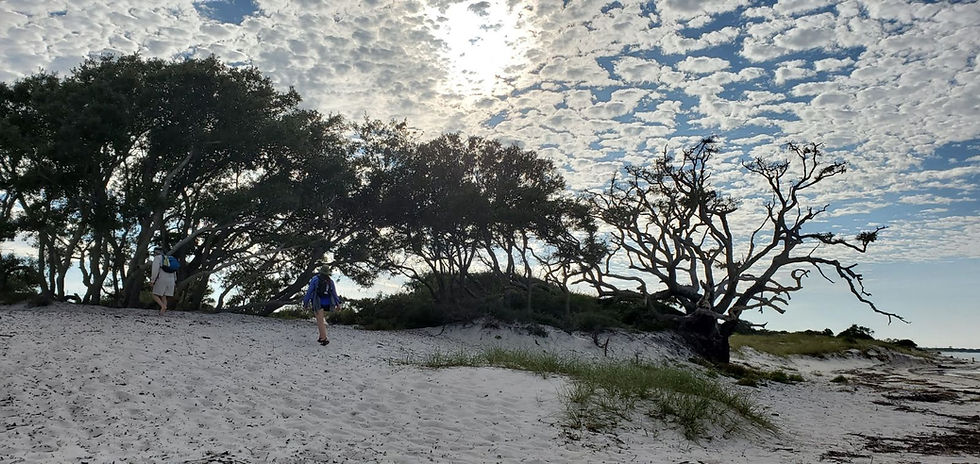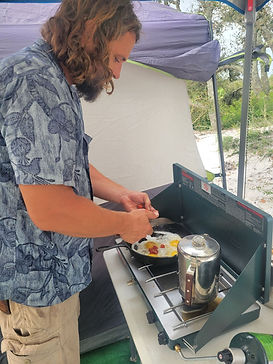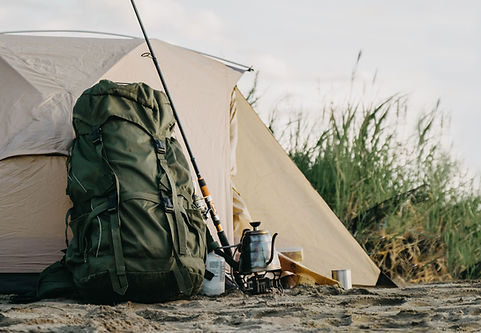
Basecamp location in the fall.



Basecamp location in the fall.
Horn Island 8 Day / 7 Night Campouts
Gulf Islands National Seashores Wilderness Refuge
-
Breathtaking views
-
Completely secluded
-
Wildlife viewing opportunities
-
Primitive Camping
-
Rich cultural history
-
Long-lasting friendships
Fall 2024
TBD
$ 900

-
Park permit fees
-
Transportation to and from the island
-
Guide Fees
-
Group gear: basecamp, cookware, fuel
-
Pre-trip planning information
-
Coffee and Continental Breakfast
-
Dinner
-
Water
-
Backpacking and outdoor skills
-
Emergency equipment and first aid

-
Transportation to Biloxi
-
Travel and Evacuation Insurance
-
Personal backpacking/camping equipment or clothing
-
Sunscreen, toiletries, and personal items
-
Fishing gear/Art Supplies
-
Lunches and snacks
-
Gratuities for guides and deckhands ($20)
-
Water bottles/Coffee cup/Utensils

All of our Horn Island meals include a diversity of tasty meals packed with nutrition and flavor. These food items pack well and are mostly shelf stable.
We provide a continental breakfast in the mornings with fresh brewed coffee and dinner in the evenings.
We regularly accommodate vegan, vegetarian, kosher, and non-gluten diets and will make adjustments for food allergies. These and other special dietary requests that require an additional fee.
*We encourage you to bring your own snacks and lunch items to eat at your own discretion. Please see our "Packing List" for suggestions.

-
Tent with a rain fly. These two are perfect: https://www.cabelas.com/shop/en/eureka-midori-3-person-tent , https://www.cabelas.com/shop/en/kelty-late-start-2-person-tent
-
Forget the tent stakes, bring a handful of plastic grocery bags. Dig a foot-deep hole in the sand, line it with two bag, fill it with sand and just twist up and tie the handles through the "stake loops" on your tent. You will need 2 bags per tent loop and guy line point. *we will demonstrate/assist
-
Sleeping mat, sleep bag, blanket, and pillow. The sand will mold to your body but is very firm. You want to be comfortable when you sleep so prioritize these items, while still packing light.
-
Lantern, headlamp and/or flashlight with fresh batteries.
-
Small shovel or garden spade for digging holes for latrines. You are responsible for burying your solid waste.
-
Pocket knife or multitool
-
Plastic or metal plate, bowl, utensil(s), and cup
-
Backpack for hiking from base camp to you personal camp
-
Canteen/water bottle (you will receive a 1-gallon jug of water to refill from the basecamp main water supply)
-
Toiletries (mouthwash, toothpaste, and toothbrush)
-
Insect Repellent (a variety, including deet) and sunscreen
-
A tarp (These are a great defense against moisture (rain or dew) and can double as a refuge from the sun.
-
Medication
-
Toilet paper - wet wipes (These are great for all around use)
Sunglasses, rain/wind gear, bathing suit, sandals with a hard sole like Chacos or Tevas, sunhat, microfiber towel, and weather-appropriate clothing (quick dry is recommended). You will probably wear the same 2-3 items the whole trip. Bring some lightweight, quick drying, pants and a long sleeve shirt. This will help with sun exposure and the bugs.
Food
We will be providing all of your water, your breakfast and dinner each day but you will need to bring items for lunches and snacks. You will find that you don't eat as much during the day. (examples - peanut butter, jerky, dried fruit, MRE, canned soup with pop tops, hard cheeses, olives, granola bars, trail mix, tuna, bread, crackers, potted meat, hot dogs to roast on fire, hobo packs, etc.). You can freeze bottles of water to keep perishable items cold for the 1st day or so then plan nonperishable items for the remainder of the trip. We will have coolers, but you may want to bring a small personal cooler.
Optional Supplies: Art supplies, fishing gear, fishing license, wet wipes, rope/Tie-downs, glow sticks, small first aid kit (we will have a large first aid kit at the base camp), battery charger for phone, spatula, backpacking camp stove, small pot for cooking in/boiling water, Nature-friendly soap, paper towels, folding chair, Zip-lock bags, trash bag, aluminum foil (folded into a flat square), clothespins or something similar, waterproof matches and fire starters (We will have extras).
Not Recommended: Large coolers that weigh more than you can carry by yourself, large tents (due to weight), nice or extra clothing, makeup and perfume (these will attract bugs), jewelry or valuables, jeans, anything heavy or bulky, no excessive gear allowed (you will have to put it back in your car).
Prohibited:
-
Mechanical devices including carts with wheels or motorized devices are prohibited.
-
No glass containers allowed.
-
No pets allowed.
-
Please practice leave no trace principles.
Essential Eligibility Criteria ("EEC) have been specifically identified to help you understand the skills and abilities necessary to participate on each Horn Island camping trip. They apply uniformly to all potential trip participants, irrespective of the presence or absence of any disability.
Once you identify a trip in which you may be interested, please carefully review the EEC and itinerary details. If after reviewing the EEC that apply to these trips, you determine you need an accommodation in order to participate, please contact us prior to registering to discuss your requested accommodation.
The EEC exist for your own safety and the safety and enjoyment of all participants. If you are unable to meet the EEC for the trip, with or without an accommodation, you are not eligible for that trip. If you register and arrive for a trip for which you do not meet the EEC, you will be disqualified from participation on the trip and will be dismissed or evacuated from the trip without a refund.
-
Be in reasonably good health and fitness.
-
Be able to breathe independently without any assistance from medical devices and/or trained professionals.
-
Be able to perceive, understand, and recall the inherent risks and hazards of the activity, including but not limited to those previously identified by the leaders.
-
Be able to stay alert and to focus attention for several hours each day for the duration of the trip and during instruction and trip activities.
-
Be able to independently perceive, understand, and follow both verbal and non-verbal instructions given by the trip leader(s) in all situations and to effectively communicate with trip leader(s) and other participants. During stressful, dangerous, or emergency situations, participant must be able independently to immediately and quickly perceive, understand, and follow both verbal and non-verbal instructions given by the trip leader(s).
-
Be able to effectively communicate with trip leaders and participants including in challenging or high stress situations (such as medical or environmental emergencies) or in challenging environmental conditions which may include conditions of limited visibility, inclement weather, and conditions which require one to overcome loud background noise such as high wind.
-
Be able to perform self-care and participate in all activities of daily living such as eating, hydration, personal hygiene, toileting (including bladder and bowel control), and dressing, either independently or with the reasonable assistance of a companion who accompanies the participant.
-
Be able to manage all personal medications, including dosing and administration, either independently or with the reasonable assistance of a companion who accompanies the participant.
-
Be able to remain adequately fed, hydrated, and properly dressed so as to avoid environmental injuries such as heat-related illness and sunburn and other injuries such as hypothermia and dehydration, either independently or with the reasonable assistance of a companion who accompanies the participant.
-
Be able to remain active and manage personal care for extended periods of mobility and exertion of potentially over 10 hours per day, either independently or with the reasonable assistance of a companion who accompanies the participant.
-
Be able to enter and exit a large boat and small skiff, either independently or with the reasonable assistance of a companion who accompanies the participant or assistance of a fellow participant or trip leader.
-
Be able to stay balanced and seated in a boat, while the vehicle is moving, up to two hours in a single day, either independently or with the reasonable assistance of a companion who accompanies the participant.
-
Be mentally and physically able to participate in a group setting without negatively impacting or jeopardizing the health or safety of the other participants or trip leader(s).
-
Be able to maintain self-care in an environment where allergen exposure and cross-contamination may occur.
-
Be able to effectively notify or communicate with a companion who accompanies the participant, trip leaders, or other participants of personal distress, injury, illness, or the need for assistance, including in adverse or challenging weather or environmental conditions.
-
Be able to properly wear and use all required protective gear and clothing.
-
Be able to meet the demands of the trip within the time limits set by the trip itinerary and trip leaders.
-
Be able and willing to use no toilet at all (which requires the ability to dig a 6 inch hole and squat over it with or without assistance).
-
Be able to navigate and travel around a designated camp area which may include physical hazards such as uneven ground, tent stakes and lines, rocks, and other natural and man-made hazards, including in darkness, with a flashlight or headlamp, or with limited light, either independently or with the assistance of a companion who accompanies the participant.
-
Be able to enter and exit a tent pitched on the ground, including in darkness, with a flashlight or headlamp, or with limited light, either independently or with the assistance of a companion who accompanies the participant.
-
Be able to sleep on the ground (with a pad designed for ground-sleeping).
-
Be able to get down to, up from, and sit on the ground, either independently or with the assistance of a companion who accompanies the participant.
-
Be able to maintain personal health and hygiene in a backcountry setting which does not include running water or flushing toilets, either independently or with the assistance of a companion who accompanies the participant. Backcountry toileting may include the use of pit-toilets, “wag-bags,” and “cat holes.”
Your safety is our top priority. Our island camping trips are led by professional guides, all of whom are wilderness-certified first responders, each with years of guiding and wilderness experience. Guides adhere to standardized risk management protocols in case of any potential or actual incident, and all trips carry an emergency communication device and comprehensive first-aid kit. Additionally we are in constant contact with park services and will use the Coast Guard for extreme emergencies.
If you have any further questions about safety, please contact us at (228)235-4435 for more information.

